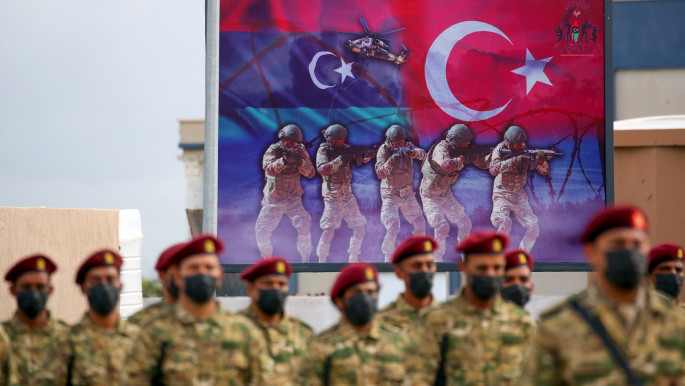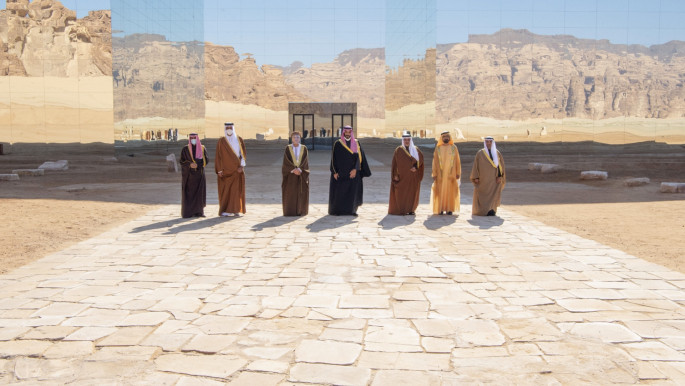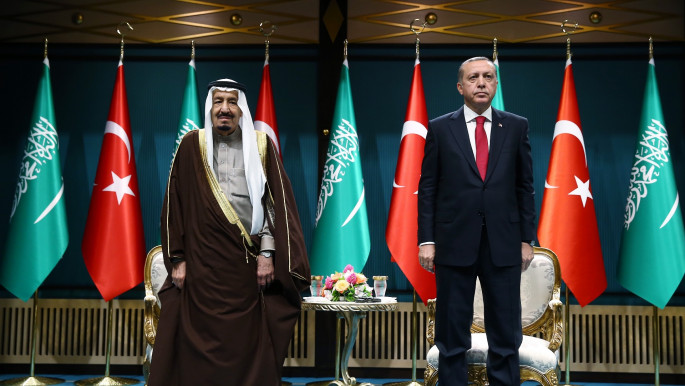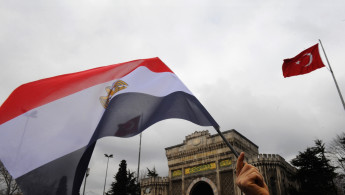What's driving the thaw in Egypt-Turkey relations?
Turkish-backed forces waging "Operation Peace Storm" were moving their way toward Sirte, the coastal city which Egypt's President Abdel Fattah el-Sisi threatened to defend, by force if necessary, from Libya's pro-Government of National Accord (GNA) groups.
Yet, this month there has been a reset between Cairo and Ankara, underscoring the extent to which these two governments have managed to relax the tension in their bilateral affairs. Now, the door is potentially open to a new chapter in Egypt-Turkey ties following nearly eight years of icy relations between these two regional powers.
This reset resulted from shrewd and highly strategic thinking on both Cairo and Ankara's part and cannot be understood in any ideological context. Egypt and Turkey are looking to engage each other on a host of issues - chiefly Libya and the maritime disputes across the Eastern Mediterranean - in realistic, not idealistic, ways.
This thaw will probably be slow due to lingering suspicions and other factors. Nonetheless, there is a genuine desire on both Cairo and Ankara's part to overcome past problems and improve bilateral relations.
Conflict in Libya
Out of all regional issues, the situation in Libya was most critical to Egypt and Turkey's reset. It seems that Egypt has come to essentially accept Turkey's entrenched influence in western Libya. Interestingly, from the beginning of Haftar's 2019/2020 "Operation Flood of Dignity" campaign, Egypt opposed the renegade general's bold military action and feared how Turkey could exploit the circumstances.
 |
Egypt has come to essentially accept Turkey's entrenched influence in western Libya |  |
The government in Cairo correctly gauged just how unrealistic Haftar was in his attempts to capture Tripoli and how other outside players such as Turkey could take advantage of any LNA failure.
Haftar's assault on Tripoli proved to be a valuable gift to Ankara. The conditions resulting from the LNA's westward offensive gave Ankara a unique chance to insert its military into Libya in ways that experts say is most likely long lasting. "The attack [on Tripoli] by Haftar actually opened up a boulevard, a real opportunity, for Turkey," Jalel Harchaoui, a Libya specialist at the Global Initiative against Transnational Organized Crime, told The New Arab.
"Turkey seized it and now it's entrenched in the country called Libya…So if you sit in Cairo, before Haftar attacked you had a Libya with no Turkish influence to speak of…and then after the attack you look at June 2020, Turkey is here to stay, it has permanent military entrenchment."
 |
|
| Read more: How does Biden view Turkey's role in Libya's uncertain future? |
Nearly two years after the LNA kicked off its campaign to "liberate" Tripoli, Egypt sees Turkey's military presence in Libya as a fact of life. Ejecting Turkish influence from western Libya is not an Egyptian foreign policy objective at this point.
It was not lost on officials in Cairo that the Turkey-aligned Libyan fighters did not take over Sirte in 2020 as a result of Russia and the United Arab Emirates (UAE), not Egypt. Despite Sisi's rhetoric about "red lines", Egypt did nothing to stop pro-GNA militias from advancing further west last year other than threaten them.
Egyptian officials realise that had it not been for the Russians and (to a lesser extent) the Emiratis, the pro-GNA forces backed by Ankara could have taken Sirte and more territory even closer to western Egypt. From this position, Cairo sees it as wise to try to reach a new understanding with Turkey on the Libya file.
Economics factor into Egypt's current assessment of how to deal with the reality of Turkey's position in Libya. Egypt knows that reconstruction work in western Libya will lead to Turkish firms signing highly lucrative contracts and making large profits. Egyptian workers (a million of whom were employed in western Libya during the Gaddafi era and sent remittances home) landing jobs with Turkish firms in Tripoli and other parts of Libya would benefit Egypt's economy.
It is a safe bet that Russian and Chinese firms will also be making some big bucks in Libya's reconstruction and redevelopment phases, but Turkey will be the main economic winner in western Libya. Gripped in its own serious economic problems, Egypt has all the more reason to pursue potential benefits of reducing friction with Ankara when it comes to lucrative opportunities in post-conflict Libya.
 |
Ankara's desire to pursue warmer relations with Egypt factors into Turkey's overall foreign policy to recalibrate its relations with a handful of regional countries |  |
It is important to realise that Egypt never wanted to burn its bridges with Tripoli. This was another reason why Cairo was not pleased with Haftar's decision to wage his offensive against the GNA in April 2019. Furthermore, the diplomatic engagement between Cairo and the GNA in late 2020 also highlighted Egypt's interest in finding a way to work with western Libya in the interest of fostering peace and stability in the country through dialogue and compromises.
An Ideological hurdle?
How will the Muslim Brotherhood issue impact the reset? Cairo is being pragmatic about its engagement with Turkey and not putting forward a maximalist or absolutist demand that the Turkish authorities expel all Muslim Brotherhood figures from Turkey. Egypt understands that Turkey giving the boot to exiled Islamists in order to meet an Arab government's demand will never occur.
Although Turkey's Muslim Brotherhood-friendly foreign policy will likely remain a major source of tension between Ankara and Cairo, this issue does not have to hinder Egypt and Turkey's ability to reach a new understanding vis-à-vis Libya.
 |
|
| Read more: How the GCC reconciliation deal could reshape the region's power balance |
In general, Turkey has three main national interests in Libya. First is maintaining Turkey's military footprint in Libya. Second is securing contracts for Turkish companies in sectors such as construction and energy. Third is preserving the 2019 Libya (GNA)–Turkey maritime deal.
Ankara pursuing specifically those three national interests in Libya is not problematic from Cairo's perspective. Egypt realises that propping up the Muslim Brotherhood in Libya is not one of Turkey's key objectives in the war-torn country. In fact, Ankara is supporting the interim government which Islamists do not dominate. This helps explain why Egypt is not making a reset with Turkey conditional on Ankara severing all ties with the Muslim Brotherhood in Libya.
"Egypt is not expecting Turkey to distance itself from the Muslim Brotherhood - this is too vague a requirement," said Harchaoui. "Egypt is not at all in the same kind of mentality as the UAE… [Abu Dhabi is] always with very maximalist demands or absolutist objectives. Egypt has over the last three or four years moved away from a narrative that was highly influenced by the UAE to a much more realistic attitude - one that is more befit to a large nation with a large demography and a long history with a large army."
 |
Gripped in its own serious economic problems, Egypt has all the more reason to pursue the potential benefits of reducing friction with Ankara when it comes to lucrative opportunities in post-conflict Libya |  |
Turkey's motivations
Turkish interests are also part of what drives this thaw. Ankara changing its tone toward Sisi's government in recent months has been a well-calculated move against the backdrop of the gas-rich Eastern Mediterranean's saga of brinkmanship. Within this body of water, Greece and Cyprus (not Egypt) are the two countries most at odds with Turkey.
Thus, Ankara wants to lure Cairo somewhat away from Athens and create somewhat of a wedge between Egypt and Greece - a partnership that Turkey does not want to see develop in the years ahead. Further, Turkey making concessions to Egypt could help Ankara sell a message to the wider world. That narrative is that when it comes to the delicate balance of power in the Eastern Mediterranean, Turkey has proven its willingness to accommodate countries on opposite sides of geopolitical and ideological divides. This could help Ankara push back against the narrative of Turkey as an aggressive and expansionist power.
 |
|
| Read more: What is driving Saudi Arabia's apparent rapprochement with Turkey? |
Ankara's desire to pursue warmer and more relaxed relations with Egypt factors into Turkey's overall foreign policy to recalibrate its relations with a handful of regional countries - also including Israel, Saudi Arabia, and possibly even the UAE too.
From Ankara's perspective, the Gulf Cooperation Council (GCC)'s al-Ula summit of January 2021, which resulted in the lifting of the blockade of Qatar, has constituted a valuable opportunity for Turkey to engage in more dialogue with Egypt. As Cairo-Doha relations continue moving in the direction of reconciliation, Turkey will likely try to join Qatar in efforts to ease friction between Egypt and the Ankara-Doha alliance.
Looking ahead, optimism about a potential rapprochement down the road needs to be realistic. Egyptian-Turkish relations are unlikely to be a walk in the park. The military coup of 2013, which toppled a Turkey-friendly Egyptian government, led to a quick deterioration of ties and significant friction between the two. Subsequent developments in the region also added to the list of problems between Cairo and Ankara. Overcoming all of these tensions can't happen at the click of a finger. Of course, there is also potential for spoilers to take actions to derail any possible Egyptian-Turkish reconciliation.
Yet it is positive how both countries have expressed their interest in talking to the other. A significant relaxation of tensions between Egypt and Turkey could bode very positively for the region and should be welcomed.
Giorgio Cafiero is the CEO of Gulf State Analytics, a Washington, DC-based geopolitical risk consultancy.
Follow him on Twitter: @GiorgioCafiero



